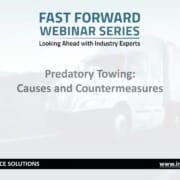MEDICAL EXAMINER FRAUD AND DOT RESPONSE
An Examination of FMCSA Audits and DOT Response
In 2024, the Federal Motor Carrier Safety Administration (FMCSA) continues its due diligence to ensure the safety of our roads by maintaining the integrity of its National Registry of Certified Medical Examiners. This registry, which was established in 2014, provides a list of certified physicians who are qualified to conduct comprehensive medical examinations for truck drivers. These examinations are a prerequisite for issuing valid medical cards, which truck drivers need to meet Department of Transportation (DOT) requirements. An essential component of this process is the FMCSA’s audit of medical examiners, aimed at curtailing medical examiner fraud, thereby ensuring the health and safety of commercial motor vehicle drivers and, by extension, all road users.
The Purpose of the FMCSA Audit
- Identifying Medical Examiner Fraud: The FMCSA’s audit is designed to identify cases of fraud within the registry. Medical examiner fraud could range from issuing medical certification without a thorough examination to falsifying medical examination results. These fraudulent practices can result in medically unfit drivers being on the road, posing a risk to public safety.
- Reinforcing Public Safety: By identifying fraudulent examiners, the FMCSA can remove them from the registry, ensuring that only legitimate and thorough medical examinations are conducted. This helps to guarantee that all commercial vehicle drivers are medically fit to drive, contributing to public safety on the roads.
- Maintaining the Integrity of the Medical Examiner Registry: The audit also serves to maintain the integrity of the National Registry of Certified Medical Examiners. This registry is an essential resource for commercial vehicle drivers, as it is the only source of certified medical examiners who can conduct the necessary medical examinations and issue valid medical cards.
The DOT’s Response to Medical Examiner Fraud
The DOT recognizes the potential dangers associated with medical examiner fraud, and as such, has demonstrated its commitment to addressing this issue head-on. Some of the measures undertaken by the DOT in response to medical examiner fraud include:
- Increased Oversight: The DOT has increased its oversight of the National Registry of Certified Medical Examiners. This includes more frequent audits and stricter enforcement of rules and regulations.
- Stricter Penalties: In cases where medical examiner fraud is identified, the DOT has imposed stricter penalties. This includes the revocation of certification and potential legal ramifications.
- Public Awareness: The DOT has also worked to raise public awareness about the dangers of medical examiner fraud, emphasizing the importance of legitimate medical examinations for commercial vehicle drivers.
The FMCSA’s ongoing audit of medical examiners on their National Registry of Certified Medical Examiners is a crucial step in minimizing the occurrence of medical examiner fraud. With the DOT’s robust response measures, the integrity of the medical examination process for commercial vehicle drivers is upheld, contributing to the safety of our roads.
Medical Examiner Fraud and DOT Response
In 2024, the trucking industry has seen a significant shift in its operations due to the increase in Medical Examiner Fraud. This ongoing issue has been affecting thousands of drivers and their companies, leading to a major inconvenience in their day-to-day operations. The Department of Transportation (DOT) has responded to this issue, but it’s clear that more needs to be done.
The core of this issue lies in the list that was compiled for the convenience of drivers who need to find their own certified physicians. This list was also intended to be a tool for trucking companies and safety managers who are responsible for assigning physicians to their drivers. However, it’s become evident that this list is far from perfect.
Some of the key areas that need attention include:
- Verification of Certified Physicians: It’s crucial that the physicians on the list are thoroughly vetted and certified to prevent any cases of fraud. This process should be comprehensive and include background checks, verification of medical qualifications, and ongoing audits to ensure compliance.
- Transparency: The DOT needs to be more transparent with its processes and how it compiles the list of certified physicians. This can help build trust with the drivers and their companies, and also ensure that they are getting the best possible medical services.
- Regular Updates: The list of certified physicians should be regularly updated to remove any physicians who are no longer practicing or have been found guilty of misconduct. This can help prevent any cases of Medical Examiner Fraud.
- Education for Drivers and Companies: It’s vital that both drivers and their companies are educated on the importance of using a certified physician from the list. They also need to understand the implications of using a physician who is not certified or is involved in fraudulent activities.
However, the DOT’s response to this issue has been less than satisfactory. Despite the increasing cases of Medical Examiner Fraud, there seems to be a lack of decisive action to tackle this issue head-on. The DOT needs to take a more proactive approach in addressing this issue to protect the drivers and their companies.
The issue of Medical Examiner Fraud is a significant one that needs immediate attention. The DOT needs to revise its strategies and take a more proactive approach to ensure the safety and well-being of the drivers and their companies. It’s clear that a more comprehensive and transparent approach is needed to tackle this issue effectively.
The Medical Examiner Fraud Fallout
The trucking industry in the United States is heavily regulated by the Department of Transportation (DOT). Among the many regulations that truck drivers must adhere to, one of the most critical is the requirement to undergo regular physical examinations by a DOT-registered medical examiner. These exams are meant to ensure that all drivers are physically fit and capable of handling the rigors of the job. However, recent revelations of fraudulent practices among some medical examiners have sent shockwaves throughout the industry.
The Role of Medical Examiners
Medical examiners who conduct these DOT physicals must be registered with the DOT. The reason for this requirement is to ensure that all doctors adhere to a consistent procedure during the exams, thus ensuring that all drivers are evaluated equally. Drivers who pass the exam are issued medical cards, and it is mandatory for them to carry these cards as proof of their physical fitness while driving.
The Fallout from Fraudulent Practices
The issue of medical examiner fraud came to light when the DOT made the alarming discovery that over 6,000 drivers had been forced to retake their medical exams and renew their certificates in the past five years. These retests were necessary because their original certificates were issued by an examiner who was suspected or later convicted of fraud.
The fraudulent actions carried out by these examiners included:
- Uploading bogus exam results to the Federal Motor Carrier Safety Administration (FMCSA) website
- Conducting driver exams without proper DOT certification
- Awarding certificates to drivers without completing a full exam
Each of these actions represents a serious breach of trust and puts the safety of the public at risk. A driver who is not physically fit to drive a truck can cause severe accidents, leading to injuries and even loss of life.
The Current State of Affairs
As of 2024, the DOT has significantly ramped up efforts to prevent medical examiner fraud. Rigorous audits have been implemented and any examiner found to be operating fraudulently is immediately delisted from the DOT registry and is subject to legal action. Through these measures, the DOT aims to restore integrity to the medical examination process and ensure the safety of all road users.
To further improve the situation, the DOT is also taking steps to increase transparency and make information more readily available to drivers. This includes providing clear guidelines on what to expect during a DOT physical and what drivers can do if they suspect that their examiner is not following proper procedures.
The issue of Medical Examiner Fraud is a serious one that has far-reaching implications for the trucking industry. While steps are being taken to address and rectify the issue, it is a reminder of the importance of vigilance and integrity in all aspects of this vital industry. These measures are not just about ensuring compliance with regulations, but more importantly, they are about ensuring the safety of all those who use our roads.
The Pervasive Impact of Medical Examiner Fraud Overview
In the trucking industry, the importance of obtaining legitimate medical certificates cannot be overstated. These documents, issued by certified medical examiners, serve as a testament to a driver’s fitness to operate heavy vehicles. However, the discovery of fraudulent certificates in circulation has raised concerns about the integrity of this crucial system. This article explores the cost implications of such medical examiner fraud, the ripple effects it creates, and how it impacts the trust dynamics within the trucking industry.
Understanding the Magnitude of the Issue
Medical examiner fraud refers to the issuance of medical certificates by individuals who are not qualified or certified to do so. While truck drivers and their employing companies are not directly liable for penalties or fees in case they unknowingly possess these illegitimate certificates, the indirect costs can be substantial.
- Financial cost: Drivers spend money on obtaining these certificates, which ultimately turn out to be worthless.
- Lost time and earnings: Drivers must wait for a new examination and certificate issuance, during which time they cannot operate their vehicles and haul freight. This lost time translates into lost income opportunities.
- Trust issues: The discovery of a fraudulent certificate can erode the trust between a driver and their employing company, especially if the company had recommended the fraudulent examiner. This can lead to decreased job satisfaction and higher driver turnover rates.
Impact on Drivers and Companies
The experience of discovering a fraudulent certificate can be quite distressing for drivers. They are forced to find a new medical examiner, which can be a time-consuming and inconvenient process. Furthermore, there is the emotional toll of dealing with a breach of trust from a medical professional who has ostensibly conducted a personal medical examination.
For trucking companies, the fallout can be equally damaging. Even though they might have been innocent victims in the scam, the incident can create trust issues between them and their drivers. If a company assigns or recommends medical examiners, drivers must trust that this information is accurate and reliable. However, an encounter with medical examiner fraud can significantly undermine this trust.
Addressing the Problem
In the face of this growing issue, it is crucial for both drivers and trucking companies to remain vigilant. They should verify the credentials of the medical examiners they engage with and ensure that they are certified by the relevant authorities. Moreover, trucking companies need to communicate transparently with their drivers about the steps they are taking to prevent such incidents. This can help rebuild trust and maintain a healthy working relationship.
The issue of medical examiner fraud is a serious concern that goes beyond financial implications. It impacts the trust dynamics within the trucking industry and can lead to significant disruptions. Therefore, it is critical for all stakeholders to work collaboratively towards addressing this problem and ensuring the integrity of the medical certification process.
Medical Examiner Fraud and DOT Regulations
The Department of Transportation (DOT) plays a crucial role in ensuring the integrity of its Federal Motor Carrier Safety Administration (FMCSA) registry. This registry lists certified medical examiners who have completed their required training and passed the necessary examinations. They are responsible for conducting physicals to assess the fitness of commercial driver’s license (CDL) holders. However, the issue of medical examiner fraud poses ongoing challenges. This refers to situations where individuals or organizations claim to be certified when, in fact, they are not.
Certification and Registry
One of the key steps that DOT has taken to curb fraud is the implementation of strict certification requirements for medical examiners. This includes mandatory training and testing before they can be certified and listed in the FMCSA registry. The rigorous process ensures that only qualified professionals are able to conduct physical examinations for CDL holders.
In 2021, DOT anticipated merging medical certificates with CDLs. This means that the FMCSA database will show whether a driver’s certificate is valid. This move towards digitization reduces the likelihood of fraudulent activity as the validity of a driver’s certificate can be easily verified.
Audits and Investigations
Despite these efforts, fraud remains an ongoing issue, and DOT continues to conduct audits and investigations to identify and eliminate fraudulent actors from the FMCSA’s list.
The responsibility, however, does not only lie with DOT. It is equally important for CDL holders and their employers to ensure that their chosen medical examiners are legitimate. The national registry should be the first and foremost guide for this verification process. In other words, there are still fakes out there, and it is up to CDL holders and their employers to make “dang sure” their chosen doctors are legit.
Best Practices
- Check the National Registry: Always verify the credentials of your chosen medical examiner through the national registry.
- Personal Verification: While the registry is a useful tool, personal verification of the examiner’s credentials is also critical.
- Stay Informed: Keep yourself updated with DOT regulations and changes to the certification process.
Looking Ahead
As we move into 2024, DOT is evaluating FMCSA’s process for approving and including physicians on their registry. This will help ensure that the process is robust and can effectively keep fraudulent actors out of the system.
Tackling medical examiner fraud requires concerted efforts from both DOT and industry stakeholders. By adhering to best practices and maintaining vigilance, it is possible to ensure the integrity of the FMCSA registry and safeguard the health and safety of CDL holders.
Comprehensive Guide to Protect Against Medical Examiner Fraud
Medical Examiner Fraud has become an alarming issue in the trucking industry. It’s crucial for companies to take proactive steps to safeguard their employees against this growing concern. Implementing preventive measures can save time, money, and potentially, the lives of drivers. Here’s a comprehensive guide to help you combat Medical Examiner Fraud.
Understanding Medical Examiner Fraud
Medical Examiner Fraud occurs when a medical examiner, certified by the Federal Motor Carrier Safety Administration (FMCSA), conducts fraudulent medical exams or provides fake medical certificates to commercial vehicle drivers. The consequences of this fraud can range from financial losses to severe health and safety risks for drivers.
Preventive Measures against Medical Examiner Fraud
- Stick with Known Doctors: Building trust with medical professionals is a key preventive measure. While having a known doctor on the FMCSA list of certified medical examiners doesn’t guarantee adherence to rules, it significantly reduces the chances of fraud. This is especially true if the doctor has a history of ethical practice.
- Make Contact with Your Doctors: Personal communication with the recommended doctors can enhance trust and transparency. Express your gratitude for their service and let them know your commitment to improving your safety culture. You can also request a copy of their DOT certification for your records.
- Provide a Vetted List of Doctors: Giving drivers a list of vetted, 100% certified medical examiners not only expedites the process of finding an examiner but also eliminates the risk of fraudulent exams. Ensure that this list aligns with the FMCSA’s list. This step also enhances professionalism and builds trust with drivers.
- Reimburse Victims of Fraud: If any drivers fall victim to Medical Examiner Fraud, consider reimbursing them. This is particularly important if the fraudulent examiner was assigned or recommended by the company. It’s a testament to your commitment to the welfare of your employees.
- Leverage Online Training Systems: Use online platforms like Infinit-I Workforce Solutions to provide important information to drivers. This platform allows you to upload a vetted list of certified medical examiners, downloadable copies of medical benefits, and other shareable information. Personal details, like medical cards, can be uploaded on a driver-to-driver basis, ensuring privacy.
The Importance of Individualized Resource Areas
Infinit-I Workforce Solutions allows for the creation of custom resource areas for each driver. These digital “cubby holes” can contain unique content tailored to the individual user. A client success representative can assist in strategizing the information to include and facilitate the uploading process.
Request a Live Demo
Infinit-I Workforce Solutions offers a live demo to help you understand how to customize available tools to maximize online training, protect your business, and retain the trust of your drivers. This can be a crucial step in combating Medical Examiner Fraud.
It’s vital for companies to take proactive steps in shielding their drivers from Medical Examiner Fraud. By building trust with known doctors, providing a vetted list of medical examiners, reimbursing victims of fraud, and leveraging online training systems, companies can create a safer environment for drivers.
FAQs
What is Medical Examiner Fraud?
Medical Examiner Fraud refers to instances when a medical examiner, certified by the Federal Motor Carrier Safety Administration (FMCSA), conducts fraudulent medical exams or provides fake medical certificates to commercial vehicle drivers. This can lead to financial losses and severe health and safety risks for drivers.
What risks do fraudulent medical examiners pose to our drivers?
Fraudulent medical examiners can issue invalid medical certificates, putting medically unfit drivers on the road. This poses substantial health and safety risks, potentially leading to severe accidents and endangering lives.
What steps can we take to prevent Medical Examiner Fraud?
Preventive measures include sticking with known doctors, maintaining direct contact with your doctors, providing a vetted list of certified medical examiners to drivers, reimbursing victims of fraud, and leveraging online training systems.
Why is it important to verify that a medical examiner is on the FMCSA list?
Verifying that a medical examiner is on the FMCSA list of certified medical examiners ensures they are certified and adhere to the necessary standards. This reduces the chances of encountering fraud, ensuring the health and safety of your drivers.
How can we protect our drivers from Medical Examiner Fraud?
Providing drivers with a list of vetted, certified medical examiners aligns with the FMCSA’s list can expedite the process of finding an examiner and eliminates the risk of fraudulent exams. This step also enhances professionalism and builds trust with drivers.
What is the role of the Department of Transportation (DOT) in preventing Medical Examiner Fraud?
The DOT plays a crucial role in ensuring the integrity of the FMCSA registry. This includes the implementation of strict certification requirements for medical examiners, conducting rigorous audits, and taking legal action against fraudulent actors.
How does a training management system help in combating Medical Examiner Fraud?
A training management system, like Infinit-I Workforce Solutions, allows you to provide important information to drivers, upload a vetted list of certified medical examiners, and store personal details like medical cards. This can be crucial in combating Medical Examiner Fraud.
How can a training management system help with storing medical, CDL, and other certifications?
A training management system allows for the digitized storage of important documents like medical and CDL certifications. This ensures easy access and retrieval, as well as automated notices for required renewals, reducing the likelihood of Out of Service issues.
What benefits can a training management system provide for our trucking company?
Apart from combating Medical Examiner Fraud, a training management system can help create a safer environment for drivers, improve operational efficiency, and enhance communication and trust within the company. This can result in increased job satisfaction, lower driver turnover rates, and improved ROI.
What is the FMCSA’s role in preventing Medical Examiner Fraud?
The FMCSA maintains a National Registry of Certified Medical Examiners, conducts audits, and removes fraudulent actors from the registry. It also provides guidelines on what to expect during a DOT physical and what drivers can do if they suspect their examiner is not following proper procedures.
What are the consequences of Medical Examiner Fraud?
Fraud can result in financial loss, time wastage, and emotional distress for drivers. For trucking companies, it can create trust issues between them and their drivers and lead to significant disruptions.
What steps can we take to rebuild trust with our drivers after an encounter with Medical Examiner Fraud?
Reimbursing victims of fraud, providing a vetted list of certified medical examiners, and maintaining transparent communication with drivers about preventive measures can help rebuild trust.
Why is it crucial to have personalized communication with our medical examiners?
Personal communication with medical examiners can enhance trust and transparency. It also provides an opportunity to express gratitude for their service and emphasize your commitment to improving your safety culture.
What is the importance of individualized resource areas in a training management system?
Individualized resource areas allow for the creation of custom content tailored to each driver. These digital “cubby holes” can contain unique content like a vetted list of certified medical examiners, downloadable copies of medical benefits, and other shareable information.
How can a training management system help us prepare for future changes in DOT regulations?
A training management system allows you to keep your drivers informed about DOT regulations and changes to the certification process, ensuring that your company stays compliant and reduces the risk of encountering Medical Examiner Fraud.
What should we do if we discover that one of our drivers has been a victim of Medical Examiner Fraud?
If a driver falls victim to Medical Examiner Fraud, consider reimbursing them, especially if the fraudulent examiner was assigned or recommended by the company. This shows your commitment to the welfare of your employees and helps maintain trust.













